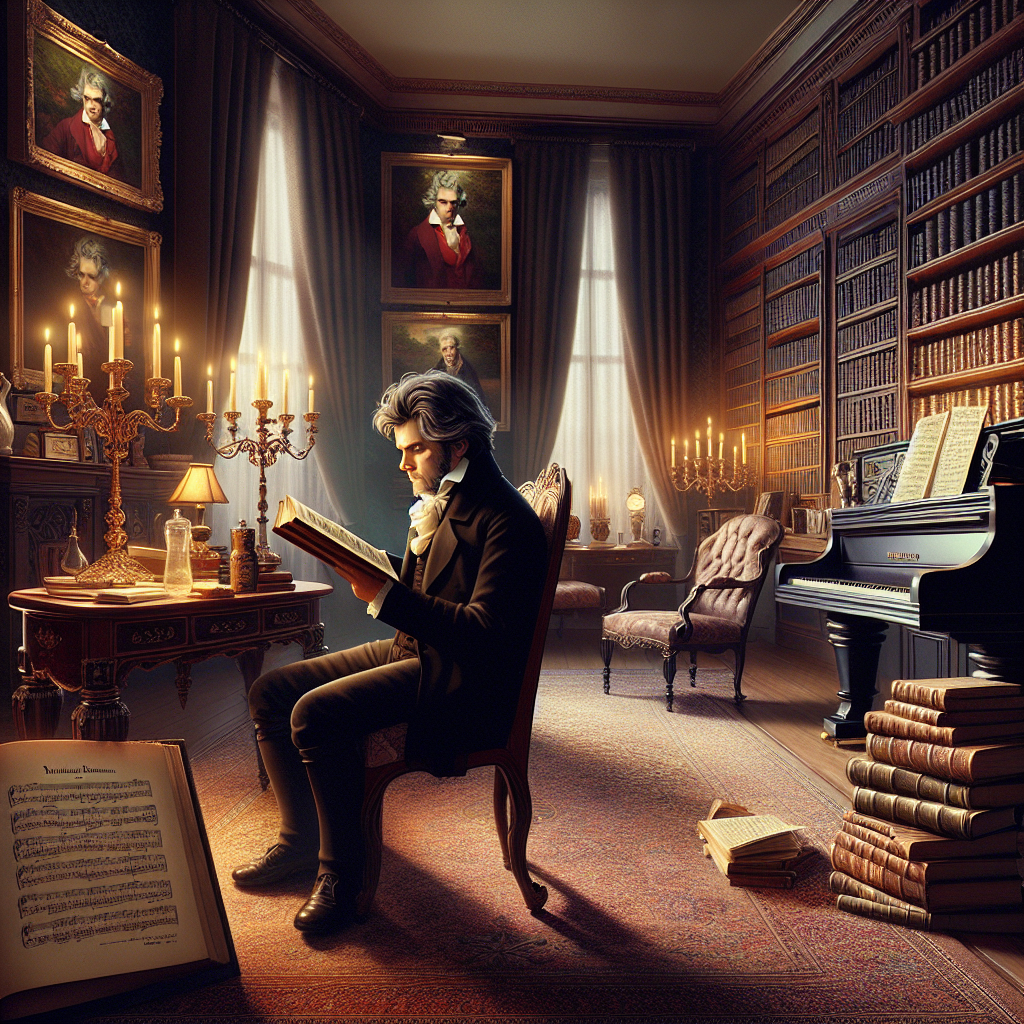
Beethoven: Influences and Literary Connections
Ludwig van Beethoven is a towering figure in classical music, whose influence and legacy extend well beyond his own era. Born in 1770 in Bonn, Germany, Beethoven’s intricate compositions, unique melodic innovations, and emotional depth have cemented him as a pioneer in the Western musical canon. However, to truly appreciate Beethoven, it’s essential to understand the environment in which he created his most renowned works. This includes not just the musical landscape, but also the broader literary and artistic movements of the time that shaped his worldview and creative expression.
Introduction:
The late 18th and early 19th centuries were a period of dynamic change and development in Europe. This era saw the dawn of the Romantic movement, a reaction against the rationality and formalism of the Enlightenment. Writers, poets, and philosophers were emphasizing emotion, individualism, and the sublime beauty of nature, which profoundly influenced Beethoven’s music. Beethoven’s contemporaries included literary giants like Johann Wolfgang von Goethe, Friedrich Schiller, and William Wordsworth, whose works paralleled his own in their exploration of human emotion and revolutionary spirit.
One of Beethoven’s most significant influences was the German poet Johann von Schiller. Schiller’s works, particularly his play “Ode to Joy,” resonated deeply with Beethoven. The sentiments expressed in Schiller’s poetry—celebrations of freedom, brotherhood, and the human spirit—echo in Beethoven’s Ninth Symphony, which famously incorporates the “Ode to Joy” in its final movement. This melding of literature and music exemplifies the symbiotic relationship between Beethoven and the literary world of his time.
Another crucial figure was Johann Wolfgang von Goethe, regarded as one of Germany’s most important literary figures. Goethe and Beethoven met in 1812, and although their relationship was complex and sometimes strained, there was a mutual respect. Goethe’s exploration of human nature and the individual’s role in society influenced Beethoven’s compositions, particularly his later works which delve into profound emotional and philosophical depths.
The impact of literary works on Beethoven was not limited to German literature. The broader European literary scene also played a role. The Romantic poets of England, such as William Wordsworth and Samuel Taylor Coleridge, championed themes that resonated with Beethoven’s own explorations of nature and human emotion. This cross-cultural exchange of ideas enriched Beethoven’s creative output, allowing him to infuse his music with a universal humanism that continues to captivate audiences today.
Beethoven and Schiller:
The relationship between Beethoven and the German poet Friedrich Schiller is one of the most notable intersections of music and literature in history. Schiller’s influence on Beethoven is most directly observed in the composer’s engagement with “Ode to Joy,” a poem written by Schiller in 1785. The poem was a passionate declaration of unity and brotherhood, virtues that Beethoven held dear throughout his life.
The journey from poetry to symphony was neither immediate nor straightforward. Beethoven first considered setting Schiller’s words to music in the early 1790s, but it wasn’t until the early 1820s that the seeds would fully blossom in the choral finale of his Ninth Symphony. This movement is often praised not only for its innovative integration of vocal and orchestral elements but also for how powerfully it conveys Schiller’s vision of universal joy and fraternity.
Beethoven’s alignment with Schiller’s ideological themes is evident in more than just a single piece. The values of freedom, justice, and human connectivity present in Schiller’s works pervaded Beethoven’s music and personal viewpoints. During a time when Europe was fraught with political upheaval, their shared belief in the power of human spirit through adversity was both a personal and public statement.
Moreover, Beethoven’s reverence for Schiller’s literary genius pushed him to expand the boundaries of traditional musical formats. The Ninth Symphony, technically and thematically ambitious, reflects an innovative fusion of literary sensibility and musical structure. This masterpiece does not merely use poetry as a text; it embodies the essence and philosophy behind the words, creating a multisensory experience that transcends both art forms.
Meeting Goethe: A Complex Relationship:
Johann Wolfgang von Goethe, whose literary works remain cornerstones of German literature, was another significant figure in Beethoven’s life. Goethe’s works, ranging from “The Sorrows of Young Werther” to “Faust,” dealt extensively with themes of human emotion, existential angst, and the pursuit of knowledge—issues that resonated deeply with Beethoven.
Their personal encounter in 1812 in the spa town of Teplitz is memorable and often recounted. Despite Beethoven’s admiration for Goethe, the meeting highlighted a striking difference in their personalities. Goethe, who was more conservative and socially oriented, was reportedly perturbed by Beethoven’s rather uncouth manners and rebellious attitude. Beethoven himself admired and respected Goethe’s literary genius but was disappointed by what he perceived as Goethe’s subservience to nobility.
Despite their differing social viewpoints, the synergy between their works cannot be overlooked. Just as Goethe’s literature often explored humanity’s deeper emotional and philosophical questions, Beethoven’s compositions did the same through music. His Egmont Overture, composed to Goethe’s play “Egmont,” is a testament to how Beethoven internalized and musically translated Goethe’s depiction of heroism and sacrifice. In this work, Beethoven’s score augments the emotional and dramatic tension of Goethe’s narrative, providing a powerful auditory counterpart to the written word.
Their mutual influence extended beyond direct collaboration. The thematic depth and complexity found in Goethe’s writings encouraged Beethoven to explore similar dimensions in his later compositions. Pieces such as the late string quartets and the piano sonatas from his final years exhibit a profundity and introspection reminiscent of Goethe’s literary style. This intellectual and emotional richness further solidified Beethoven’s music as not just an art form but also a medium of profound human expression.

The Influence of English Romantic Poets:
Beethoven’s admiration for literature was not confined to German writers alone; he was also profoundly inspired by the English Romantic poets. The likes of William Wordsworth, Samuel Taylor Coleridge, and Lord Byron embodied the Romantic ideals of intense emotion, the awe of nature, and a focus on individual experience.
Wordsworth’s thematic emphasis on nature and human emotion deeply resonated with Beethoven. The composer often found solace and inspiration in the natural world, evident in pieces like the Symphony No. 6, nicknamed “Pastoral.” This symphony, with its vivid depictions of rural life, thunderstorms, and peaceful pastoral scenes, mirrors the evocative imagery and emotive depth found in Wordsworth’s poetry.
Similarly, the dramatic flair and exploration of existential themes in Lord Byron’s works found a kindred spirit in Beethoven’s music. Byron’s “Childe Harold’s Pilgrimage,” with its introspective musings and heroic ennui, can be seen as echoing the emotional and personal trials Beethoven conveyed in his compositions. The sense of solitude, struggle, and triumph pervading both Byron’s verse and Beethoven’s music underscores a shared Romantic consciousness.
Coleridge’s exploration of the mystical and the sublime was another fertile ground for Beethoven’s creativity. The ethereal qualities and imaginative landscapes in Coleridge’s poetry are akin to the sublime and often fantastical nature of Beethoven’s later works. The Ninth Symphony’s choral finale, for example, evokes a sense of transcendence and universal brotherhood, reflecting the same yearning for the sublime seen in Coleridge’s poetic excursions.
The Broader European Influence: 400 words
While German and English literary figures had a profound impact on Beethoven, the broader European intellectual climate also significantly influenced his work. The Age of Enlightenment and the burgeoning Romanticism that followed were not restricted to any single country but were a part of a larger continental dialogue.
French literature and philosophy, embodied by figures like Jean-Jacques Rousseau and Voltaire, also left their mark on Beethoven. Rousseau’s championing of individual freedom and emotional expression can be seen reflected in Beethoven’s own ideals and music. Voltaire’s wit and critical stance towards authority resonate with Beethoven’s rebellious nature and his struggles against societal constraints.
Additionally, the Italian operatic tradition, with its emphasis on dramatic narrative and emotional expression, offered another rich source of inspiration. Beethoven’s only opera, “Fidelio,” reflects the influence of this tradition. The opera’s themes of justice and personal sacrifice are aligned with the broader Enlightenment and Romantic values that were prevalent across Europe.
Beethoven’s exposure to a diverse range of literary and philosophical currents enriched his musical language and conceptual frameworks. His music is not just a product of German Romanticism but a synthesis of various European intellectual and artistic traditions. This cosmopolitanism in his influences contributed to the universal appeal of his work, enabling it to transcend cultural and temporal boundaries.
Conclusion: Beethoven’s Literary Symphony
Ludwig van Beethoven’s oeuvre is often discussed solely within the context of music. However, understanding his profound connection with the literary currents of his time offers a richer appreciation of his artistry. The interplay between his music and the literature of his era is a testament to the interdisciplinary nature of artistic inspiration and expression.
Beethoven’s engagement with the works of Friedrich Schiller and Johann Wolfgang von Goethe illustrates how profound and impactful his connection with contemporary literature was. Schiller’s “Ode to Joy” epitomizes Beethoven’s belief in brotherhood and unity, immortalized through the Ninth Symphony. Goethe’s exploration of human nature and individual spirit found a resonant echo in Beethoven’s emotionally and philosophically rich compositions.
Beyond German literature, the Romantic ideals championed by English poets like Wordsworth, Coleridge, and Byron significantly inspired Beethoven’s creative process. Their themes of nature, emotion, and the sublime are vividly mirrored in his symphonies and sonatas. Furthermore, the wider European intellectual milieu, including French philosophy and Italian opera, contributed to the depth and breadth of Beethoven’s musical vision.
Beethoven’s synthesis of literary, philosophical, and musical elements not only elevated his works but also positioned them within a broader cultural context. His music transcends pure auditory experience to engage with the listener on intellectual, emotional, and philosophical levels. It’s this interdisciplinary richness that has secured Beethoven’s enduring legacy as a colossus of Western music and culture.
In conclusion, exploring Beethoven’s relationship with the literature of his time provides invaluable insights into his creative genius. It underscores the interconnectedness of the arts and how literary works significantly influenced his musically revolutionary ideas. Recognizing these connections allows us to appreciate not just the notes he composed but also the profound human experiences and cultural dialogues they represent.